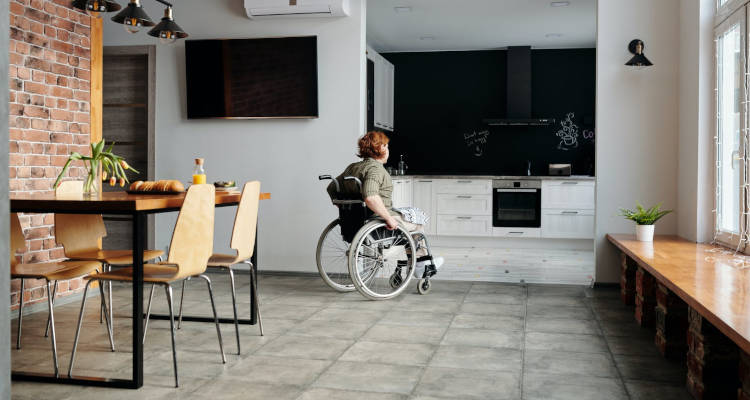Reasons to adapt your tourist accommodation for the disabled
People with disabilities who look for accessible tourism often come up with thousand barriers. The main one, in terms of infrastructure, is that not all tourist accommodations are adapted to the needs of this profile of guests.
Both people with disabilities and those with mobility problems represent an important market niche that any tourist accommodation must take into account: Satisfying their needs is the key to increase revenue, increase bookings in your accommodation and lengthen the tourist seasons.
It already was the UNWTO ( World Tourism Organization) itself that a few years ago spoke about the importance of adapting tourist accommodation for the disabled. The aim was to take advantage of the increase in demand for accessible tourism and to create destinations and infrastructures accessible to all types of people.
In the words of the UNWTO Secretary-General: “Accessibility is a crucial element of any responsible and sustainable tourism policy. It is a human rights issue and it is also an extraordinary business opportunity. Above all, we must realise that accessible tourism is not only good for people with disabilities or special needs, it is good for everyone”.
Since then, many tourist accommodations have already adapted their facilities for the disabled. In turn, they manage to be recommended and avoid bad ratings from guests.
Here are the many reasons why you should adapt your property to the needs of these guests.
Why adapt my tourist accommodation for people with reduced mobility?
You will be able to cover an important market niche
We have to understand accessible tourism as another opportunity. It allows us to expand our client portfolio, as well as to improve the quality of the tourist accommodation sector.
People with disabilities are guests with very specific needs, which is an “important new niche” to be covered. Meeting their needs will mean reaching 15% of the world’s population that we would not be able to reach without properly equipped facilities.
In addition, let us not forget about the fact that the population has been ageing rapidly over the last few years. With a surprising prediction for 2050, according to the UNWTO: “The number of people over 60 years of age will have increased to represent 20% of the world’s population, with one fifth of this group over 80 years of age”.
This leads us to the conclusion that if we adapt our accommodation we will be making a very important social commitment. We will make it possible for all of us to exercise our right to enjoy tourism without obstacles.
If you are an accessible tourist accommodation, add this information in the description of your tourist accommodation, so you can attract more travellers!
It is not an investment, it is a “social bet”.
Although the rehabilitation or adaptation of your tourist accommodation can be an investment, it can also be considered a “social bet”. This is due to the importance of accessible tourism in the world – 15% of the world’s population is a very large number of potential customers!
Promoting the rights of people with disabilities to participate socially in their community and offering them a means of accommodation adapted to their needs will bring many advantages to your business and to the tourism sector.
This movement is significantly accepted and valued by society. This means that “betting on social” will promote an image of social engagement and a better online reputation of your tourist accommodation compared to those who do not.
Proof of this is that more and more tourist accommodations are adopting the accessible badge: among them hotels for the disabled, campsites adapted for the disabled, accessible rural tourism, etc.
You will be able to differentiate yourself from other not accessible accommodations
You can enjoy a competitive advantage in your accommodation that will make people with disabilities decide to book at your property and not at other accommodations. Bear in mind that there are thousands and millions of holiday rental properties around the world, but there are surprisingly few that are suitable for disabled or elderly people with mobility problems. With this in mind, if you are able to adapt your property, you will be able to offer something that other accommodations cannot and improve your search engine ranking.
How to adapt my tourist accommodation for disabled people?
Taking into account the above information, we are going to highlight some of the main adjustments that you should consider in order to offer accessible tourist accommodation. It is about giving certain keys to ensure that all users can move around the accommodation comfortably and independently.
Design of the property and its entrances
It is recommended the accommodation to be located on a single level, horizontal and without access barriers. This design without levels will make the stay much more comfortable for people with reduced mobility as it eliminates the usual barriers (such as stairs).
If horizontality is not possible in the accommodation, there is another option. Barriers posed especially by the difference in levels can be eliminated. For example, in the case of stairs, various supports such as handrails, handrails and ramp access can be incorporated.
Width of doors and windows
A special width of 80 centimetres is recommended for the doors of the tourist accommodation. This ensures independent access and movement of wheelchair users in the accommodation. Similarly, corridors should be sufficiently wide.
It is recommended to incorporate sliding windows and sliding doors as far as possible. This will considerably reduce the effort that a person has to make to open or close them.
Other adaptations for the disabled in tourist accommodation
The location of light switches or sockets should be accessible: neither too high nor too low. Or even an automatic switch-on system can be considered.
It is also recommended to incorporate: Inclined mirrors, washbasins and adapted chairs for facilities such as the bathroom.






